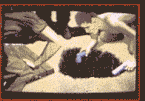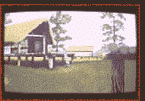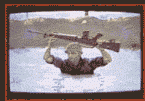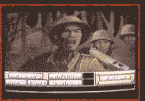|
Q: Ian, I`m glad you
offer your time for an interview, that`s very kind ;-) Here we go!
Tell us, when was 'Shadow Development' born and who came up with the idea.
How did the team come together?

A: Shadow Development
was just Simon Cooke (coder) and myself working from home. We'd met
through working on a job together and decided that working for ourselves
was the way to go. Unfortunately we lived over a couple of hundred miles
apart, so rarely saw each other for the few years
 we were in business, but
it rarely seemed to be a barrier. This must sound like very low-key
production, but you have to remember that this was in the early days of
games computing when it was still possible for development teams to be
doing everything from their bedrooms. It was also a time when teams were
regularly being ripped off by publishers, so we wanted to stay in control
of our own projects as much as possible. we were in business, but
it rarely seemed to be a barrier. This must sound like very low-key
production, but you have to remember that this was in the early days of
games computing when it was still possible for development teams to be
doing everything from their bedrooms. It was also a time when teams were
regularly being ripped off by publishers, so we wanted to stay in control
of our own projects as much as possible.
Prior to this I'd pretty
much just been a home enthusiast until I managed to get a job in-house at
a company in Bristol called 'Arcana', who created a few games for the
Amiga and Atari. Possibly the most well known of these was a trivia game
called 'Powerplay', which sold very well.
Simon was amongst the
first people I'd met who really explored the Amiga's capabilities. He'd
been involved in conversion work, but he too wanted to do games based on
his own ideas. Simon's really great, very funny and with a pronounced
hatred of software industry bullshit similar to mine.
Q:
Was there any special reason you did a game settled in an historical
context. Were you interested in creating a correct portrait of this time.
How could you, as an artist, prepare yourself for your work?

A:
At the time we were
looking for ideas, Cinemaware games were very popular - 'Defender of the
Crown', 'Rocketeer', etc. The trouble with them was that although the
graphics were far better than anything else on the market at the time, the
games themselves were a bit thin on gameplay. We could never understand
how the American development team that created them was (from memory) at
least 40 strong - and still not coming up with the goods. All the games
seemed like missed opportunities. We were sure that we could give them a
run for their money and thinking (hoping) we could compete with them was a
real buzz!
 We'd talked about doing
a game that had the same presentation as Cinemaware for a long time and
toyed with the idea of doing a historical recreation of the English Civil
War. In the end, once I'd realised the wealth of material available on the
Vietnam war it seemed the wisest choice of theme. It also leant itself
very much to creating a strong feeling of tension and fear as the player
moved throught the terrain. Booby traps, locals who may have been friends
or foes (and never knowing which), enemy ambush and even the terrain
itself - every soldier there had to cope with tremendous pressure. We'd talked about doing
a game that had the same presentation as Cinemaware for a long time and
toyed with the idea of doing a historical recreation of the English Civil
War. In the end, once I'd realised the wealth of material available on the
Vietnam war it seemed the wisest choice of theme. It also leant itself
very much to creating a strong feeling of tension and fear as the player
moved throught the terrain. Booby traps, locals who may have been friends
or foes (and never knowing which), enemy ambush and even the terrain
itself - every soldier there had to cope with tremendous pressure.
I learned a lot about
the war as I was researching ideas for Lost Patrol, most of it I wish I
hadn't. It was a grim, pointless war that has many similarities to the war
in Iraq now.
Q:
How was it like working with the other guys. Who was in control? The
coder, you, anyone else? Who had the idea of mixing different genres
together? Can you give us an impression of how your daily work looked like,
any events you remember? How much time did you spent on the project?

A: Working with
Simon was great. I had a lot of ideas that just weren't feasible, but he
did his best to bring them to life. Neither of us was in control really,
we just got on with doing things, there were never any conflicts. In terms
of mixing genres, that was again down to taking the Cinemaware format and
trying to broaden it. The original version we had planned was to have had
much broader and more detailed sub-games, but we were restricted by the
amount of discs that Ocean would let us release on, so a lot of ideas we
wanted to use had to go, I think to the game's detriment. We were so
restricted on size for some sections that it's a wonder they made it in at
all. them to life. Neither of us was in control really,
we just got on with doing things, there were never any conflicts. In terms
of mixing genres, that was again down to taking the Cinemaware format and
trying to broaden it. The original version we had planned was to have had
much broader and more detailed sub-games, but we were restricted by the
amount of discs that Ocean would let us release on, so a lot of ideas we
wanted to use had to go, I think to the game's detriment. We were so
restricted on size for some sections that it's a wonder they made it in at
all.
Development took over a
year, but the main stumbling block was Ocean themselves. The problem was
that they
were bringing out games like Batman that were strongly arcade
titles and trying to get us to mould Lost Patrol to that kind of arcade
structure. We on the other hand wanted a deep, realistic game that echoed
some aspects of early text-based adventures and required that you interact
constantly with your team and those you met. It was always a struggle and
we came in months late on completion because of trying to resolve the way
we saw the game and the way that Ocean did.
A day in my life at the
time was split between going to the library,
watching war films and buying research books and doing the actual drawing.
Each screen took about 3 days to complete, 12 - 14 hours a day a pixel at a
time. Some of the pictures are imaginary, some montages of various war
photo's. We also had restrictions on the palette we could use, so many of
the pictures are done in a range of 32 green-ish reds!
Q:
What equippment did
you use for your work? Where there any plans to convert the game to more
plattforms right from the beginning. Who converted the game to Atari ST
and PC?

A:
We did the Atari
version ourselves. To create the screens I used - as now - DPaint2 Animate
for all the screens on an Amiga 500 - no amazing technical equipment at my
end! I love it as a package. It's very instinctive to use and the only
software I know that allows the kind of pixel work I need to do.
We wanted to bring the
game out just on Amiga and ST, but Ocean insisted that we also do a PC
version. They sourced a great team to do the conversion, but I think it
was in 4 screen colours and we hardly ever heard from them as they did
their version. No requests for our control stat's for the game, its
structure or how and why we structured the game as it was. I think they
were just given an Amiga game and told to go and convert it by play alone!
Ocean were interested only in getting titles out onto as many formats as
possible, with little caring about gameplay.
Q:
How, when and why did
you team up with 'Ocean Software Limited'? Can you tell us some advantages/disadvantages
of working with Ocean. Some words about about restrictions, deadlines,
payment ;-), help?

A:
Christ . . . Okay. It
was hell. They were unsupportive and downright obstructive at times. We'd
taken the game
idea and some screens to a couple of smaller companies, and
thought we'd got it made
when Ocean signed us up. How wrong we were! They
were determined it was going to be an arcade game, we were
 determined that
it wasn't - it was bound to go wrong at some point. But we also got to
know other teams who were also working for them and discovered that Ocean
was (alledgedly) known for not paying scheduled advances on time and
being less than truthful when it came to paying royalties. Nobody stood a
chance. They told you what sales had been like and you just had to suck it
up. I still to this day believe that the game sold far in excess of what
they told us. determined that
it wasn't - it was bound to go wrong at some point. But we also got to
know other teams who were also working for them and discovered that Ocean
was (alledgedly) known for not paying scheduled advances on time and
being less than truthful when it came to paying royalties. Nobody stood a
chance. They told you what sales had been like and you just had to suck it
up. I still to this day believe that the game sold far in excess of what
they told us.
They still owe us over
£5,000 (which was a hell of a lot of money back then), held back they said
'just in case there were returns'. We tried to take them to court to get
the money, but of course, they had more cash for lawyers than us, so after
a costly battle we just had to let it go. My wish for many years was that
upon my death my ashes would be scattered over the head of Gary Bracey,
the then boss of development at Ocean :-)
|